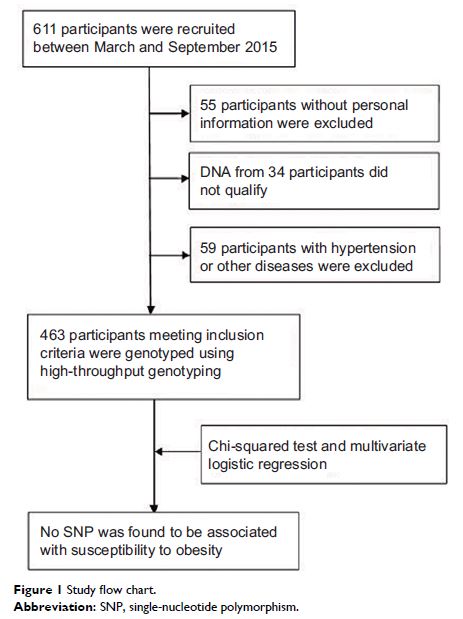108605
论文已发表
注册即可获取德孚的最新动态
IF 收录期刊
- 3.4 Breast Cancer (Dove Med Press)
- 3.2 Clin Epidemiol
- 2.6 Cancer Manag Res
- 2.9 Infect Drug Resist
- 3.7 Clin Interv Aging
- 5.1 Drug Des Dev Ther
- 3.1 Int J Chronic Obstr
- 6.6 Int J Nanomed
- 2.6 Int J Women's Health
- 2.9 Neuropsych Dis Treat
- 2.8 OncoTargets Ther
- 2.0 Patient Prefer Adher
- 2.2 Ther Clin Risk Manag
- 2.5 J Pain Res
- 3.0 Diabet Metab Synd Ob
- 3.2 Psychol Res Behav Ma
- 3.4 Nat Sci Sleep
- 1.8 Pharmgenomics Pers Med
- 2.0 Risk Manag Healthc Policy
- 4.1 J Inflamm Res
- 2.0 Int J Gen Med
- 3.4 J Hepatocell Carcinoma
- 3.0 J Asthma Allergy
- 2.2 Clin Cosmet Investig Dermatol
- 2.4 J Multidiscip Healthc

SLC15A1 和 PLA2G16 基因多态性与中国人肥胖症发展的关系
Authors Wang CY, Liu S, Xie XN, Luo ZY, Yang L, Tan ZR
Received 7 January 2018
Accepted for publication 7 May 2018
Published 22 August 2018 Volume 2018:11 Pages 439—446
DOI https://doi.org/10.2147/DMSO.S161808
Checked for plagiarism Yes
Review by Single-blind
Peer reviewers approved by Dr Andrew Yee
Peer reviewer comments 3
Editor who approved publication: Professor Ming-Hui Zou
Introduction: The small peptide transporter 1 (PepT-1) and adipose phospholipase A2 (AdPLA) play a key role in the development of obesity. However, there are no data assessing the impact of PepT-1 (SLC15A1 ) and AdPLA (PLA2G16 ) variants on obesity susceptibility. Therefore, we assessed the contribution of 9 single-nucleotide polymorphisms (SNPs) between these two genes on obesity susceptibility in Chinese subjects.
Materials and methods: A total of 611 participants were enrolled in the study, and 9 SNPs in the SLC15A1 and PLA2G16 genes were selected. Blood samples were collected for genotyping. Overweight and obesity were established by body mass index. Regression analyses were performed to test for any association of genetic polymorphisms with weight abnormality.
Results: The genotype frequencies (P =0.04 for rs9557029, P =0.027 for rs1289389) were significantly different between obese or overweight subjects and healthy controls. However, no significant difference in allele was found between these three groups (P >0.05). Further logistic regression analyses adjusted for age and sex also failed to reveal significant associations between overweight, obesity, and the selected SNPs (P >0.05).
Conclusion: Data indicate that the selected 9 SNPs in SLC15A1 and PLA2G16 genes were not related to obesity susceptibility in the Han Chinese population.
Keywords: obesity, BMI, Chinese subjects, genotyping, SNPs
